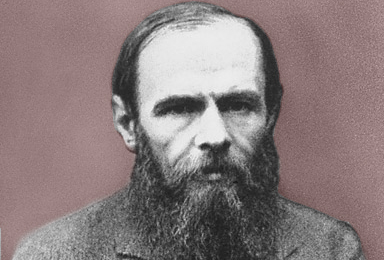
In a letter to his older brother Michael, Fyodor Dostoevsky derives a creative epiphany from a story of money matters and industry drama.
November 26, 1846
All my plans about publishing have fallen through. The whole idea, however, was doubtfully profitable, needed much time, and was possibly premature. The public might have held off. I mean to postpone all that till next autumn. I shall by then be better known, and my position will be more defined. Besides, I have some money coming in. “Goliadkin” is now being illustrated by an artist in Moscow, and two artists here are doing pictures for “Poor Folk.” Whichever does them best, gets the commission. Bernardsky tells me that in February he wants to do business with me, and will pay me a certain sum for the right topublish my works with his illustrations. Till now he has been occupied with the illustrations to “Dead Souls.” In a word, the publishing plans no longer interest me. Moreover, I have no time. I have a lot of work and commissions. I must tell you that I have broken off all relations with the Sovremennik as far as Nekrassov represents it. He was vexed because I wrote also for Krayevsky (as I had to do, so as to work off his advances of money to me), and because I would not make the public declaration which he desired, saying that I no longer was on the editorial staff of the O.Z. When he saw that he could get no new work from me in the immediate future, he flung various rudenesses at my head, and was foolish enough to demand money from me. I took him at his word, and drew up a promissory note which covered the whole amount, payable on December 15. I mean to see them coming to me hat in hand. As soon as I roundly abused Nekrassov, he curtsied and whimpered like a Jew that’s been robbed. In short, it’s a shabby story. Now they are spreading it about that I’m off my head with conceit, and have sold myself to Krayevsky, because Maikov praises me in his paper. Nekrassov henceforth means to drag me down. But as to Bielinsky, he is so pliable that even about literary matters he changes his views five times a week. With him alone have I kept up my former happy relations. He’s a thoroughly good fellow. Krayevsky was so delighted by this whole affair that he gave me money, and promised besides to pay all my debts up to December 15. Therefore I must work for him until the early New Year.
Now look, brother—from the whole business I have deduced a sage rule. First, the budding author of talent injures himself by having friendly relations with the publishers and proprietors of journals, the consequence of which is that those gentry take liberties and behave shabbily. Moreover, the artist must be independent; and finally, he must consecrate all his toil to the holy spirit of art—such toil is holy, chaste, and demands single-heartedness; my own heart thrills now as never before with all the new imaginings that come to life in my soul. Brother, I am undergoing not only a moral, but a physical, metamorphosis. Never before was there in me such lucidity, such inward wealth; never before was my nature so tranquil, nor my health so satisfactory, as now. I owe this in great measure to my good friends: Beketov, Saliubezky, and the others with whom I live. They are honest, sensible fellows, with fine instincts and affections, and noble, steadfast characters. Intercourse with them has healed me. Finally, I suggested that we should live together. We took a big house all to ourselves, and go share and share alike in all the housekeeping expenses, which come, at the most, to 1,200 roubles a head annually. So great are the blessings of the communal system! I have a room to myself, and work all day long.
From Letters of Fyodor Michailovitch Dostoevsky to His Family & Friends. Trans. Ethel Colburn Mayne. London: Chatto & Windus, 1914. Web. HathiTrust Digital Library.
FURTHER READING
Vissarion Belinsky hailed Dostoevsky as the “heir to Gogol.” Read an excerpted correspondence from Belinsky to Gogol here.
Starting on page 200 of this online resource, you can find a discussion of the impacts that the Beketov Circle had on Socialist beliefs.


